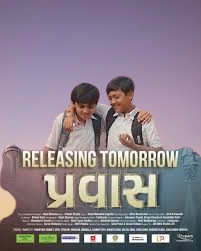Pravas Movie 2025 Movierulz Review Details

Pravas (2025) Review: Director’s Vision and Creative Pulse
Quick take
As a film writer with 15 years of coverage under my belt, I came to Pravas expecting a small, intimate Gujarati drama — and Vipul Sharma delivers precisely that: quiet, rooted, and emotionally honest.
Release date: 7 November 2025. Award: Best Children’s Film — Dhaka International Film Festival.
Star Ratings
| Aspect | Score (out of 5) |
|---|---|
| Overall | 3.8 / 5 |
| Director’s Vision (Vipul Sharma) | 4.2 / 5 |
| Performances | 4.0 / 5 |
| Emotional Depth | 4.0 / 5 |
Note: This rating’s personal — could change on director’s cut.
Overview of the Director’s Vision
Vipul Sharma writes and directs a film about small hopes and big realities. The choice to shoot on-location in a remote Gujarati village is more than authenticity — it’s a deliberate storytelling tool.
Choice: natural locations that become characters themselves.
Directorial Goals (what Sharma seems to aim for)
- Intimacy: close frames on children and family interactions.
- Realism: non-glossy visuals, lived-in settings.
- Emotional economy: fewer dramatic flourishes, more quiet beats.
Insight: Sharma prefers small gestures over big speeches to convey longing.
Takeaway: The film trusts the audience to feel, not to be told how to feel.
Directorial Choices — What Worked
| Choice | Effect |
|---|---|
| On-location village filming | Immersive authenticity; location informs character behaviour. |
| Child-centric perspective (Tino’s POV) | Emotional clarity; innocence anchors harder social themes. |
| Minimal melodrama | Believability; allows small moments to land. |
Insight: The restrained direction amplifies simple scenes — a glance, a missed bus, a quiet laugh.
Takeaway: These choices make Pravas feel lived-in, not constructed.
Directorial Choices — What Could Be Sharpened
At times the pacing leans slow for viewers used to sharper plot propulsion. A few sequences could use tighter editing to maintain momentum.
Constructive notes
- Occasional drift in the middle act reduces narrative urgency.
- Supporting characters sometimes remain under-explored.
- Music cues could have been used bolder to lift certain transitions.
Insight: The film’s commitment to calm can be misread as tentative direction.
Takeaway: A trim of 5–7 minutes might make the emotional beats hit harder without losing warmth.
Influences & Inspirations
There are traces of regional realist filmmaking and children’s-lens stories seen in world cinema. Pravas nods to slow, humanist films where small acts reveal big truths.
Influences: village realism, child-centered narratives, social-realist tones.
| Inspiration | How it appears in Pravas |
|---|---|
| Humanist regional cinema | Authentic lives, focus on small communities. |
| Children’s-perspective films | Simple viewpoint that reveals adult complexities indirectly. |
Insight: Sharma blends local specificity with universal childhood longing.
Takeaway: Viewers who like low-key, heartfelt stories will connect with the influences on display.
Comparison to Past Works
Vipul Sharma here appears to be consolidating his voice rather than reinventing it. For audiences familiar with his earlier sketches of rural life, Pravas feels like a more confident, fully realised step.
| Element | Past Work | Pravas |
|---|---|---|
| Scope | Smaller vignettes | Feature-length, expanded emotional arc |
| Emotional focus | Observational | Centered on a child’s longing |
| Technical polish | Modest | Improved production values, confident framing |
Insight: Pravas reads as a director finding steadier control over tone and tempo.
Takeaway: If this is a signpost, Sharma’s next work could aim higher — broader themes with the same intimacy.
Cast Highlights (how direction shapes performances)
| Actor | Role | Directorial impact |
|---|---|---|
| Vishal Thakkar | Tino | Natural, unaffected; Sharma allows silence to speak for him. |
| Jay Pandya | Hari | Grounded, emotionally tethered to family dynamics. |
| Komal Panchal | Lakshmi | Warmth in small scenes; direction keeps her subtle. |
| Nishma Soni | Sapna | Supports the central arc with gentle restraint. |
Insight: Sharma’s direction lets performances breathe — especially the child lead.
Takeaway: The film benefits when actors are given space; that’s a directorial strength.
Technical Notes: Visual & Sound Choices
Though the focus is directorally-driven, technical teams align with Sharma’s tastes: unobtrusive sound, warm natural lighting, and handheld or static framing depending on intimacy.
- Lighting: soft, daylight-driven to enhance realism.
- Sound design: restrained — ambient village noises carry scenes.
- Editing: measured, sometimes languid.
Insight: The technical design supports the director’s humanist intent rather than calling attention to itself.
Takeaway: Cohesion between direction and craft deliver an honest viewing experience.
Final Verdict — The Director’s Score
Vipul Sharma’s Pravas is a compassionate, well-judged film. It may not be flashy, but it’s consistent in tone and intention.
Director’s assessment: A clear step forward — empathetic storytelling with room to sharpen pacing.
Short recommendation
If you appreciate tender family dramas told from a child’s viewpoint — and value authentic regional storytelling — Pravas is worth your time. As a reviewer who’s covered hundreds of films, this one stands out for its sincerity.
FAQs
| Q1: Is Pravas suitable for children? | A1: Yes. The film centres on a child protagonist and has been awarded Best Children’s Film at Dhaka. |
| Q2: Does the film feel regional or universal? | A2: Both — it’s rooted in Gujarati life but the themes of longing and resilience read universally. |
| Q3: How significant is Vipul Sharma’s role as writer-director? | A3: Crucial — his dual role shapes the film’s consistent tone and intimate focus. |
Closing note: This rating is my personal take and could evolve with future viewings or a director’s cut.

